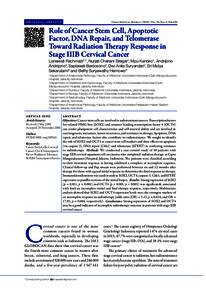Document
Role of cancer stem cell, apoptotic factor, DNA repair, and telomerase toward radiation therapy response in stage IIIB cervical cancer.
Identifier
DOI 10.5001/omj.2019.43
Contributors
Siregar, Nurjati Chairani., Author
Kanoko, Mpu., Author
Andrijono, Andrijono., Author
Bardosono, Saptawati., Author
Publisher
Oman Medical Specialty Board.
Gregorian
2019-05
Language
English
Subject
English abstract
Objectives: Cancer stem cells are involved in radioresistant cancers. Transcription factors Sry-related HMG box (SOX2) and octamer binding transcription factor 4 (OCT4) can confer pluripotent cell characteristics and self-renewal ability and are involved in carcinogenesis, metastasis, tumor recurrence, and resistance to therapy. Apoptosis, DNA repair, and telomerase factors also contribute to radioresistance. We sought to identify the role of SOX2 and OCT4 as cancer stem cell markers and their effects on apoptosis (via caspase 3), DNA repair (Chk1) and telomerase (hTERT) in conferring resistance to radiotherapy. Methods: We conducted a case-control study of 40 patients with stage IIIB cervical squamous cell carcinoma who completed radiation therapy at Cipto Mangunkusumo Hospital, Jakarta, Indonesia. The patients were classified according to their treatment response as having exhibited a complete or incomplete response. Clinical follow-up and Pap smears were performed between six and 12 months after therapy for those with a good initial response to determine the final response to therapy. Immunohistochemistry was used to analyze SOX2, OCT4, caspase-3, Chk1, and hTERT expression in paraffin sections of the initial biopsy. Results: Strong expression of SOX2 (p = 0.011, p = 0.001) and OCT4 (p < 0.001, p < 0.001) was significantly associated with both an incomplete initial and final therapy response, respectively. Multivariate analysis showed that SOX2 and OCT4 expression levels were the strongest markers of an incomplete response to radiotherapy (odds ratio (OR) = 5.12, p = 0.034, and OR = 17.03, p = 0.004, respectively). Conclusions: Strong expression of SOX2 and OCT4 may be a good indicator of incomplete radiotherapy outcome in patients with stage IIIB cervical cancer.
Member of
Resource URL
Citation
Rachmadi, Lisnawati, Siregar, Nurjati Chairani, Kanoko, Mpu, Andrijono, Andrijono, Bardosono, Saptawati, Suryandari, Dwi Anita, Sekarutami, Sri Mutya, & Hernowo, Bethy Suryawathy (2019). Role of cancer stem cell, apoptotic factor, DNA repair, and telomera
Category
Journal articles

